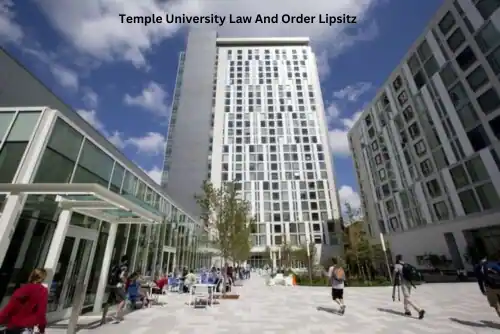
Introduction to Temple University Law and Order Lipsitz program
At the intersection of legal studies and community service lies a groundbreaking initiative at Temple University: the Law and Order Lipsitz program. This unique offering not only equips aspiring lawyers with essential skills but also emphasizes the importance of justice in our society. With an innovative curriculum designed to tackle real-world issues, this program stands out for its commitment to producing socially responsible legal professionals. If you’re considering a career in law and want to make a meaningful impact, exploring what Temple University Law and Order Lipsitz has to offer could be your next big step. Dive into this dynamic program that prepares students for success while advocating for equity and justice!
History and Purpose of the Program
The Temple University Law and Order Lipsitz program has a rich history rooted in the pursuit of criminal justice reform. Established to address pressing legal issues, it aims to empower students through rigorous academic training.
Designed with a clear mission, this program emphasizes real-world application of law principles. It integrates theory with practical skills, preparing graduates for impactful careers in public service and advocacy.
From its inception, the focus has been on creating leaders who can navigate the complexities of the legal system. The program reflects an understanding that law is not just about rules but also about justice and equality.
Through community engagement and interdisciplinary collaboration, Temple University strives to cultivate informed professionals dedicated to making a difference. This commitment resonates deeply within the curriculum, shaping future attorneys who prioritize ethics alongside their practice.
Curriculum and Courses Offered by Temple University Law And Order Lipsitz
The curriculum at Temple University Law and Order Lipsitz is designed to equip students with essential legal knowledge and practical skills. Courses cover a wide array of subjects, including criminal law, civil rights, and public policy.
Students delve into case studies that challenge them to think critically about real-world issues. This hands-on approach fosters analytical thinking alongside theoretical understanding.
Specialized electives allow for deeper exploration in areas such as juvenile justice or forensic science. These courses ensure that graduates can adapt to various legal environments.
Moreover, the program emphasizes interdisciplinary learning. Collaborations with other departments enrich the educational experience and broaden perspectives on law-related issues.
In all aspects of the curriculum, there’s a strong focus on ethical practice and community engagement. Students are prepared not just as lawyers but as advocates for justice within their communities.
Experiential Learning Opportunities
Experiential learning is at the heart of the Temple University Law and Order Lipsitz program. Students dive into real-world experiences that enhance their understanding of legal concepts.
Through internships, students work alongside seasoned professionals in various law enforcement agencies and non-profit organizations. This hands-on exposure enriches their educational journey significantly.
Additionally, simulation exercises allow students to role-play in courtroom settings or negotiation scenarios. These activities foster critical thinking skills and improve public speaking abilities.
The program organizes workshops where experts share insights on current challenges within the legal landscape. Networking events further connect students with alumni who have successfully navigated similar paths.
These experiential opportunities not only bolster resumes but also instill confidence in future attorneys committed to justice and community service.
Success Stories and Alumni Achievements
Temple University Law and Order Lipsitz has a remarkable track record of producing successful graduates who make significant impacts in their fields. Alumni have gone on to hold pivotal roles in government, public policy, and private practice.
One standout is Sarah Thompson, who now serves as an attorney for the Department of Justice. Her work focuses on civil rights cases that enhance community welfare nationwide.
Another notable alumnus, Marcus Chen, founded a nonprofit organization committed to legal advocacy for underprivileged communities. His initiatives have transformed countless lives.
These success stories reflect the program’s commitment to cultivating leaders dedicated to justice and equality. The strong network among alumni fosters collaboration and mentorship opportunities that continue long after graduation.
Student Life and Resources in Temple University Law And Order Lipsitz
Student life at Temple University Law and Order Lipsitz is vibrant and dynamic. The community fosters collaboration, allowing students to form meaningful connections with peers and faculty alike.
The campus offers various resources designed to support academic success. From dedicated study spaces to extensive legal libraries, students have access to everything they need for research and learning.
Additionally, numerous student organizations enrich the experience. These groups focus on areas such as advocacy, public service, and diversity. Engaging in these activities helps build valuable skills while creating a sense of belonging.
Support services like counseling and career development are also readily available. They guide students in navigating challenges both academically and personally.
Networking events hosted throughout the year provide opportunities for professional growth. Students can interact with alumni who share insights into their careers in law enforcement or related fields.
How to Apply and Admission Requirements
Applying to the Temple University Law and Order Lipsitz program is straightforward, but it requires careful attention to detail. Start by gathering your academic transcripts, a personal statement, and letters of recommendation. These documents are crucial in showcasing your qualifications.
The admissions committee looks for candidates with strong academic backgrounds and relevant experiences. Your personal statement should reflect your passion for law enforcement or public service.
Standardized test scores may also be required; check the latest guidelines on their official site.
Once you’ve compiled all necessary materials, submit them through the online application portal before the deadline. Don’t forget to pay attention to specific requirements unique to this program.
After submission, prepare for potential interviews where you’ll discuss your motivations and aspirations within law enforcement settings. This step provides an opportunity for you to stand out even more amongst other candidates.
Funding and Scholarships
Temple University Law And Order Lipsitz offers various funding options to support students pursuing their legal education. Financial aid can alleviate some of the burdens associated with tuition and living expenses.
Students can explore scholarships specifically designed for those in the program. These scholarships recognize academic excellence, leadership qualities, and a commitment to social justice.
Additionally, there are opportunities for need-based grants that provide essential financial assistance based on individual circumstances.
Prospective students should also consider federal student loans as another avenue for financing their education. The application process is straightforward, ensuring that everyone has access to necessary resources.
Engaging with faculty advisors can help identify suitable funding sources tailored to each student’s needs. Taking proactive steps early in the admission process will optimize chances for securing financial support.
Future Outlook of the Temple University Law And Order Lipsitz
The future of the Temple University Law and Order Lipsitz program looks promising. As legal landscapes evolve, so too does the curriculum designed to prepare students for emerging challenges in law enforcement and public policy.
Innovative partnerships with local agencies are expected to expand, providing students with unparalleled real-world experience. This synergy will ensure that graduates are not just well-versed in legal theory but also equipped for practical applications.
Emerging fields such as cybersecurity law and criminal justice reform will likely find their way into course offerings. The school remains committed to adapting its educational framework to meet societal needs.
With a strong focus on community engagement, the program aims to produce leaders who advocate for justice both locally and nationally. Enthusiasm within faculty suggests that exciting developments lie ahead for students pursuing careers in law enforcement or related fields.
Conclusion
Temple University Law and Order Lipsitz stands out as a unique program that bridges the gap between legal education and real-world application. With its rich history, dedicated faculty, and comprehensive curriculum, it prepares students to excel in various facets of law enforcement and justice. The emphasis on experiential learning ensures graduates are not only knowledgeable but also equipped with practical skills.
Students benefit from a vibrant campus life enriched by numerous resources tailored to support their academic journey. Alumni achievements reflect the program’s commitment to excellence, showcasing successful careers across diverse fields within law and order.
For those considering this path, understanding the admission requirements and exploring available funding options is crucial for navigating the process smoothly. This program paves the way for promising futures in an ever-evolving legal landscape.
Temple University Law and Order Lipsitz embodies innovation in legal education, fostering leaders who will make impactful contributions to society. Whether you’re interested in public service or private practice, this program can be your launching pad into a fulfilling career marked by purpose and achievement.






